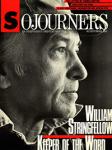There is no room for fear in love; perfect love banishes fear. For fear brings with it the pains of judgment, and anyone who is afraid has not attained to love in its perfection.—1 John 4:18
Bill loved the bishop and people of the Episcopal Diocese of Tennessee, so he stood before the men of the church at their annual conference in 1963 and uttered some words which at the time were harsh and outrageous to them. He did it with fear banished.
It was a presidential election year, an insane war was raging in Southeast Asia, and racial violence was sweeping through dozens of U.S. cities. Bill spoke in his usual easy fashion. He talked of the signs of the times and referred to them as a combination that might well bring the American experiment to a close. He talked of judgment and of the vocation of the Christian in the face of judgment. He called names, cited various positions being taken by the two major contenders for the presidency, used words such as "Antichrist," and said that Dr. Martin Luther King Jr. was the best friend American white people had.
The last statement would find few demurrers today. But in 1963, as the Episcopal Churchmen of Tennessee met in annual session in the little mountain town of Monteagle, it was an obscenity and a sacrilege. And to bring partisan politics into the proceedings of that body was as unthinkable as suggesting that a Jehovah's Witnesses woman be consecrated as presiding bishop. One simply didn't do it.
Bill's address was interrupted by frequent outbursts: boos, catcalls, jeers, foot stomping, and booming verbal disputations. The director of the conference center ran frantically up and down the center aisle, arms flailing, red-faced, pausing at the foot of the pulpit long enough to scream, "Please! Please! Please! Not here. Not in this hall. Not in this pulpit! Please! No politics in here!"
To him, the Dubose Conference Center was a holy place. The gathering each year of the men of the church was a sacred occasion. It was his charge and obligation to keep it that way. Bill had no quarrel with any of that, just a different understanding of what was appropriate to say and do in holy places and on sacred occasions.
The little man they had unwittingly chosen from the long list of potential speakers—a lawyer, theologian, and layman—did not flinch in the face of this scene, which was barely a whisper from pandemonium. He stood like a river rock in roaring rapids, staring down one angry detractor after another as his words continued to flow—words which by modulation and inflection sounded so harmless and gentle, until the barbed wire began to rake across the naked and exposed flesh of the hearer.
It was clear that he was not afraid of the storm he had brought to the holy mountain. I stood at the back of the hall and heard the physical threats and insults of the constant going and coming of members of the audience, men of the church, men no more than an hour removed from the traditional Anglican happy hour and little more distanced from the communion rail. They could not bear to remain inside and hear the scandal. But once they got outdoors, the urge not to miss the excitement overwhelmed them and they returned. Many in the group just sat quietly, thinking what thoughts I could not know.
"How could he do that to us?" one of the more agitated ones asked me as he made his way back inside.
"Maybe he's a prophet," I whispered, hoping that he would think I was a fellow conference participant, hoping even more that he didn't know I was the one who had driven this madman to their meeting, or that he didn't hear me at all.
Not having attained to love in its perfection, thus with my fear not banished, I had already gone outside and moved the car, pointing it downhill, prepared to make a hasty retreat.
As the bishop gave the benediction, I eased around the building and slipped in a side door. I had in mind getting my friend, this troubler of hallowed grounds, out the same way and moving on down the mountain. Once inside I realized that Bill had made his way directly through the crowd and was standing at the door I had just abandoned, shaking the hand of any who would offer, smiling as innocently as if he had led them in the Pledge of Allegiance, ignoring the continuing hostility.
"Bill, you sorry Yankee, you could have got us both killed in there," I said as I pulled onto Highway 41 and headed west.
"Well?" he said. And that was all he said. So I began talking about what a lovely mountain evening it was. And about the little kitten he had helped our family bury that afternoon.
Will Campbell is author of Brother to a Dragonfly and Cecelia's Sin and was director of the Committee of Southern Churchmen when this article appeared.

Got something to say about what you're reading? We value your feedback!
